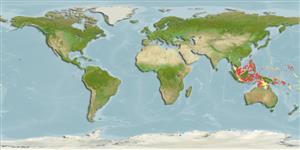Teleostei (teleosts) >
Ovalentaria/misc (Various families in series Ovalentaria) >
Pseudochromidae (Dottybacks) > Pseudochrominae
Etymology: Pseudochromis: Greek, pseudes = false + Greek, chromis = a fish, perhaps a perch (Ref. 45335); pylei: Named after Robert M. Pyle (not Richard L. Pyle) who described with J.R, Randall 2 species" Cirrhilabrus scottorum Randall & Pyle, 1989 and Rabaulichthys stigmaticus Randall & Pyle, 1989.
Eponymy: Robert M Pyle, a travel agent by profession, was honoured for helping Randall collect and photograph fishes, including an underwater photograph of this species. (He is no relation to ichthyologist Richard L. Pyle, also mentioned in the description) (Ref. 128868), visit book page.
More on authors: Randall & McCosker.
Environment: milieu / climate zone / depth range / distribution range
Ecology
Marine; reef-associated; depth range 40 - 87 m (Ref. 90102). Tropical
Western Central Pacific: Palau, Indonesia and Papua New Guinea
Size / Weight / Age
Maturity: Lm ? range ? - ? cm
Max length : 8.0 cm TL male/unsexed; (Ref. 9710)
Inhabits steep drop-offs. It has been collected at Palau at depth of 85 m (Ref. 37816). Also found among coral rock and rubble with intermixed sand areas (Ref 90102).
Life cycle and mating behavior
Maturity | Reproduction | Spawning | Eggs | Fecundity | Larvae
Lieske, E. and R. Myers, 1994. Collins Pocket Guide. Coral reef fishes. Indo-Pacific & Caribbean including the Red Sea. Haper Collins Publishers, 400 p. (Ref. 9710)
IUCN Red List Status (Ref. 130435: Version 2024-2)
Threat to humans
Harmless
Human uses
Tools
Special reports
Download XML
Internet sources
Estimates based on models
Preferred temperature (Ref.
123201): 26.8 - 28.9, mean 27.6 °C (based on 48 cells).
Phylogenetic diversity index (Ref.
82804): PD
50 = 0.5000 [Uniqueness, from 0.5 = low to 2.0 = high].
Bayesian length-weight: a=0.00501 (0.00193 - 0.01299), b=3.10 (2.88 - 3.32), in cm total length, based on LWR estimates for this (Sub)family-body shape (Ref.
93245).
Trophic level (Ref.
69278): 3.5 ±0.5 se; based on size and trophs of closest relatives
Fishing Vulnerability (Ref.
59153): Low vulnerability (10 of 100).
